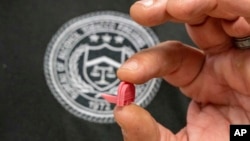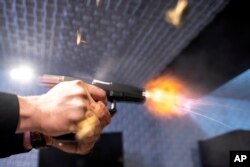Eleven-year-old Domonic Davis was not far from his mom's Cincinnati home when a hail of gunfire sprayed out from a passing car. Nearly two dozen rounds hurtled through the night at a group of children in the blink of an eye.
Four other children and a woman were hurt in the November shooting that killed Domonic, who had just made his school basketball team.
“What happened? How does this happen to an 11-year-old? He was only a few doors down,” said his father, Issac Davis.
The shooting remains under investigation. But federal investigators believe the 22 shots could be fired off with lightning speed because the weapon had been illegally converted to fire like a machine gun.
Communities around the United States have seen shootings carried out with weapons converted to fully automatic in recent years, fueled by a staggering increase in small pieces of metal or plastic made with a 3D printer or ordered online.
Laws against machine guns date back to the bloody violence of Prohibition-era gangsters. But the proliferation of devices known by nicknames such as Glock switches, giggle switches, auto sears and chips has allowed people to transform legal semi-automatic weapons into even more dangerous guns, helping fuel gun violence, police and federal authorities said.
“Police officers are facing down fully automatic weapon fire in amounts that haven’t existed in this country since the days of Al Capone and the Tommy gun,” said Steve Dettelbach, director of the Bureau of Alcohol, Tobacco, Firearms and Explosives, or ATF. "It’s a huge problem.”
The agency reported a 570% increase in the number of conversion devices collected by police departments between 2017 and 2021, the most recent data available.
Guns with conversion devices have been used in several mass shootings, including one that left four dead at a Sweet 16 birthday party in Alabama last year, and another that left six people dead at a bar district in Sacramento, California, in 2022. In Houston, police officer William Jeffrey died in 2021 after being shot with a converted gun while serving a warrant. In cities such as Indianapolis, police have seized them every week.
The devices that can convert legal semi-automatic weapons can be made on a 3D printer in about 35 minutes or ordered online from overseas for less than $30. They’re also quick to install.
Once in place, they modify the gun's machinery. Instead of firing one round each time the shooter squeezes the trigger, a semi-automatic weapon with a conversion device starts firing as soon as the trigger goes down and doesn’t stop until the shooter lets go or the weapon runs out of ammunition.
“You're seeing them a lot in stunning numbers, particularly in street violence,” said David Pucino, deputy chief counsel at Giffords Law Center.
In a demonstration by ATF agents, the firing of a semi-automatic outfitted with a conversion device was nearly indistinguishable from an automatic weapon. Conversion devices with differing designs can fit a range of different guns, enabling guns to fire at a rate of 800 or more bullets per minute, according to the ATF.
“It takes two or three seconds to put in some of these devices into a firearm to make that firearm into a machine gun instantly,” Dettelbach said.
Between 2012 and 2016, police departments in the U.S. found 814 conversion devices and sent them to the ATF. That number grew to more than 5,400 between 2017 and 2021, according to the agency's most recent data.
They took hold in Minneapolis in 2021 and helped fuel record-breaking gun violence that year, said police Chief Brian O'Hara. Along with spraying out bullets at a dizzying speed, switches make a gun much more difficult for the shooter to control, so more people can be hit by accident.
“The thing is shaking as it’s firing, so we wind up getting multiple victims, people hit in extremities during the same shooting incident, because the person cannot control the weapon," O'Hara said.
The city has seen a decline in their use since the September 2022 arrest of a man charged with selling switches that he had ordered from Russia and Taiwan or made himself, O'Hara said. But “it's still a very, very real problem,” he said. “This is having a really deep impact on families, on neighborhoods and communities.”
While the devices are considered illegal machine guns under federal law, many states don't have their own specific laws against them. In Indiana, police were finding them so often — multiple times a week in the state's capital — that the state changed the law to ensure it included switches.
“We have to update the laws regarding machine guns to deal with the problems of today," Indianapolis police Chief Chris Bailey said.
Only 15 states have their own laws against the possession, sale or manufacture of automatic-fire weapons, according to Giffords. Indiana was one of many states that have regulations with exceptions. Five states have no state-level machine-gun regulations at all.
But long before prosecution, police must find the conversion devices. Often about the size of a quarter, they can easily go unnoticed by the untrained eye after being installed, said Dettelbach.
He recalled visiting a Texas police department after the ATF hosted a training on conversion devices. Afterwards, the chief searched the weapons in the evidence room and found several with previously undetected conversion devices.
“These items don’t always look as dangerous as they are," he said. “If you see some of them, they're pieces of plastic and metal, and sometimes it’s even hard to recognize them when they’re actually on or in the firearm because they blend in.”
They're also increasingly a fixture online, in social media and rap lyrics, Davis said. “Everyone is talking about switches,” he said. “It’s a scary trend.”
Davis struggles to talk about the loss of his son. Domonic would often come with his dad on Fridays to get a haircut at the barber shop where Issac Davis works. The shooting also fell on a Friday, making the end of the week an especially tough time.
Davis hopes to start a foundation called For Every Eleven to fight gun violence and honor his son's memory.

